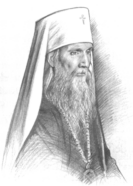Ecumenism Awareness: The Anti-Ecumenical Stance of the ROCA
The Anti-Ecumenical Stance of the Russian Orthodox Church Outside of Russia (ROCOR or ROCA)
The History of the Russian Orthodox Church Abroad (ROCA): by St. John Maximovitch of Shanghai and San Francisco. Also see the many excellent links on web site for the Russian Orthodox Cathedral of St. John the Baptist, Washington, D.C.
The Meaning of the Russian Diaspora, by St. John of Shanghai and San Francisco. "To the Russians abroad it has been granted to shine in the whole world with the light of Orthodoxy.... But if it does not perform this purpose, and even abases Orthodoxy by its life, the Diaspora will have before itself two paths...."
Ecumenism, by Metropolitan Vitaly.
Elder Ephraim on the Russian Orthodox Church Abroad.
Epistles of Metropolitan Philaret
"We observe, however, that nobody in a higher position than our own is raising his voice; and this fact constrains us to speak out, lest at the Last Judgment we should be reproached for having seen the danger of Ecumenism threaten the Church, and yet not having warned her Bishops."
—Metropolitan Philaret, A Sorrowful Epistle
|
A Clear Voice for Orthodoxy in the Twentieth Century 
|
Metropolitan Philaret of New York: a brief article introducing this modern confessor of the faith and clear voice of Orthodoxy.
An Open Letter to Archbishop Iakovos (1969), on the occasion of the latter's participation at St. Patrick's Cathedral in the "Week of Prayer for Christian Unity," and the "Ecumenical Doxology" in the Greek Cathedral of the Holy Trinity.
Ecumenical Doxology with Archbishop Iakovos, Sunday, January 26, 1969. This was sent to me by a friend of the Orthodox Christian Information Center. For those who have always wondered what went on at these infamous events, this will be an eye-opener.
A Protest to Patriarch Athenagoras: On the Occasion of the Lifting of the Anathemas of 1054.
A Sorrowful Epistle: (1969), the first of three. This is especially helpful for tracing the historical development of the Ecumenical movement. [On this also see Fr. John Reeves' essay "The Price of Ecumenism"].
Fr. Alexander Schmemann Replies to the Sorrowful Epistle, with Fr. Michael Azkoul's "Rejoinder."
A Second Sorrowful Epistle: written two years after "A Sorrowful Epistle." Expands upon the first epistle to include critiques of modernism, ecumenism as a syncretistic heresy involving world religions, and the monophysites.
"The Thyateira Confession": or, Third Sorrowful Epistle (1975).
Various Positions of the ROCA
In the opinion of the Church Abroad, suspending relations between the two Churches did not at all mean that the two were divided. The Church Abroad continues to maintain that all the Russian Churches, the Patriarchal Church, the Church Abroad, and the Catacomb Church, are part of one Russian Church. The question of what part of the Russian Church followed the correct, canonical path, preserving the traditions and heritage of the old Russian Church, is one which, in the opinion of the Church Abroad, can be determined only by a freely-elected All-Russian Local Council of the Russian Church, in which would participate representatives of the Patriarchal Church, the Church Abroad and of the Catacomb Church.
—Hernot Zeide, The Russian Orthodox Church Abroad: Jubilee Collection, Jordanville, 1988, p. 344
The Response to Elder Tavrion, including the "Declaration" of the ROCA Synod reiterating their official ecclesiology in the face of extremist views.
In Defense of Fr. Dimitry Dudko, by Blessed Father Seraphim of Platina.
1983 Council of Bishops Resolution on Ecumenism: discusses the 1983 Anathema; include comments by Fr. Alexander Lebedeff.
On Talks with the Moscow Patriarchate, by Fr. George Lardas.
True Orthodoxy or Arrogation?, Address of a Member of the IV All-Diaspora Council.
The Ecclesiastical Principle of oikonomia and the ROCOR under Metropolitan Anastassy, by Nun Vassa.
Book Review: of A History of the Orthodox Church in America 1917-1934 by Bishop Gregory (Afonsky). Reviewed by Michael Woerl.

